About this course
We are extremely excited about offering this new cadaveric foot and ankle ultrasound guided injection course for 2022.
We have designed a brand new program for those who wish to focus on foot and ankle musculoskeletal ultrasound guided injections. This cadaveric foot and ankle ultrasound guided injection course will provide the perfect environment at the fantastic facilities of Anglia Ruskin University, Chelmsford.
This course is predominantly practical, with supplementary online lectures and tutorials that can be viewed before, during and following the course itself. We know what it takes to develop this skill – and that it requires practice ,practice and practice so this is the focus of this unique one day course.
With a maximum of 3 delegates per ultrasound machine, and a high tutor:delegate ratio, you will have regular feedback and practical time. There will be a strong clinical focus throughout the course and the majority of common peripheral foot and ankle joint injections will be covered. We have a multidisciplinary team of tutors, all able to offer their unique insights an experiences.
Venues
- Anatomy Centre, Anglia Ruskin University, Bishop Hall Lane View Location Maps
How to get here?
Details on how best to reach the venue can be found on the Anglia Ruskin University website here
Who is the cadaveric foot and ankle ultrasound guided injection course suitable for?
This course is suitable for allied health or medical professionals who:
- Have some prior experience of MSK ultrasonography – for example an introductory foot and ankle musculoskeletal ultrasound course. For more information on why we feel its important to have experience of diagnostic skills prior to considering performing ultrasound guided injections, see our recent blog post here.
- Are employed in a professional environment that enables you to utilise this within your practice
- Have a recognised professional medical qualification and current registration with a relevant UK professional body eg HCPC or GMC, or foreign equivalent if travelling from abroad.
This course provides 14 CPD credits (Day 1 = 7 credits, Day 2 = 7 credits) in accordance with the CPD Scheme of the Royal College of Radiologists
Course Dates & Booking
All prices shown below are inclusive of VAT
If your attendance on the course is to be funded by your trust or you have any other queries then please contact us.
| Date | Places | Price | |
|---|---|---|---|
| Date | Places | Price |
The next course starts in....
Day(s)
:
Hour(s)
:
Minute(s)
:
Second(s)
EXTRA ONLINE LECTURES AND TUTORIAL VIDEOS
NEEDLE VISUALISATION TUTORIALS ONLINE 24/7
All course delegates who attend our ultrasound guided injection training will get unlimited access to five tutorials on basic needle skills, like the one to the right. These will provide an excellent source of information for you to review during your learning and before the course.
- Part 1: Needle Insertion Point
- Part 2: Bevel position
- Part 3: Cross cut artefact
- Part 4: Toe in the probe
- Part 5: Angle of needle entry

ONLINE LECTURES 24/7
All course delegates who attend our ultrasound guided injection training will get unlimited access to five online lectures by our course tutors. These provide a more in-depth appreciation of the topics outlined below. We are constantly adding to this selection, so keep your eyes peeled!
- Needle visualisation
- Aseptic technique
- Informed consent
- Ultrasound guided injections and the evidence base
- Why we use cadaveric specimens for our guided injection training
GAIN ACCESS TO OUR PRIVATE FACEBOOK MSK ULTRASOUND COMMUNITY OF PRACTICE
By attending our courses you will also gain access to your tutors in our private, Facebook community of MSK Ultrasound practice with specific groups for upper and lower limb MSK Ultrasound pathology, discussing anonymised cases and articles of interest. We also have groups for upper and lower limb guided injection techniques, discuss your techniques – what went well, what could be improved and what the evidence is. Lastly, but importantly we have established groups on training and governance.

Cadaveric foot and ankle ultrasound guided injection course outline
This is the proposed course outline over the day. This subject to changes.
| Time | Activity |
|---|---|
| 8.45am | Coffee and registration |
| 9am | Introduction to the course and meet the tutors |
| 9.15am - 10.30am | Techniques for needle visualisation - Lecture and demonstration followed by practicals with cadaveric specimens. |
| 10.30-11am | Break - coffee and refreshments provided |
| 11am -12.30pm - Practical session 1 | Ultrasound guided interventions for the ankle - practical session 1: Dissection room practice of US guided procedures on thiel embalmed cadavers: Intrarticular techniques of the ankle joint, subtalar joint, peroneal tendon and tibialis posterior tendon sheath, Achilles high volume stripping and retrocalcaneal bursa. |
| 12.30pm - 1.15pm | Lunch - provided |
| 1.15pm - 2.30pm - Practical session 2 | Ultrasound guided interventions for the midfoot region: Dissection room practice of US guided procedures on thiel embalmed cadavers incuding intrarticular techniques of the talonavicular, calcaneocuboid, tarsometatarsal joints. Plantar fascia injection techniques. |
| 2.30-3pm | Break |
| 3pm - 4.30pm - Practical session 3 | Ultrasound guided interventions for the forefoot region: Dissection room practice of US guided procedures on thiel embalmed cadavers including Naviculocuneiform jojnt, 1st MTP, lesser MTPJ's, Mortons Neuroma. |
| 4.30pm | Finish |
Course tutors
(We reserve the right to alter the exact teaching team for events, if you have specific requirements please email us at [email protected])

Mr Stuart Wildman
Advanced Practice Physiotherapist and Consultant MSK Sonographer BSc MSc PG Cert
Stuart is an Advanced Practice Physiotherapist and Consultant MSK Sonographer working in the NHS in London. He has an interesting working week, dividing his time between Radiology and Physiotherapy, here he performs both diagnostic and guided interventions in both. He qualified from the University of Southampton in 2003 with a BSc Physiotherapy, and went on to gain an MSc in Advanced Neuromusculoskeletal Physiotherapy at The University of Hertfordshire and a PG Cert in MSK Sonography at Canterbury and Christ Church University.
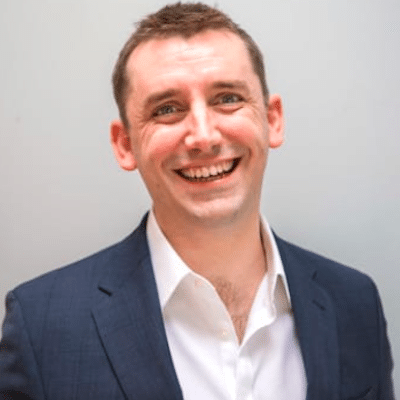
Mr Ewan Kannegieter
Consultant Podiatric Surgeon
Ewan Kannegieter is a Consultant Podiatric Surgeon working for the NHS with Provide CIC across Mid-Essex. He undertakes all aspects of foot surgery eg bunions, hammer toes, arthritis, Achilles repair, flat foot and diabetic lower limb salvage surgery, working closely with the vascular and plastic surgery teams at Broomfield, Chelmsford. He works in the private sector for the Phoenix Hospital Group. Ewan is the Vice Dean of Podiatric surgery for the UK, is a surgical tutor in Podiatric Surgery and sits on the Royal College of Podiatry Faculty of Podiatric Surgery Board.
Mr Kannegieter has memberships of the Royal Society of Medicine, Royal College of Podiatry and its Faculty of Podiatric Surgery, The Health and Care Professions Council, the International Association of Diabetic Foot Surgeons (IADFS), The American Limb Preservation Society and the Artificial Intelligence in Medicine organisation.
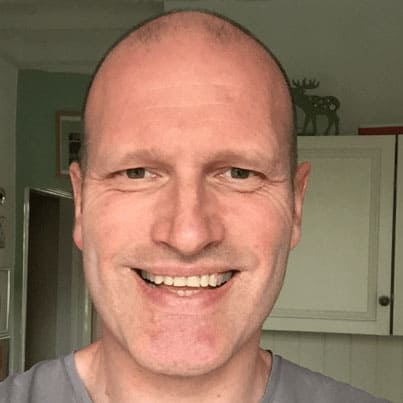
Mr Robert Mast
Advanced Practice Physiotherapist, MSK Sonographer and Independent Prescriber
Rob trained and qualified as a physiotherapist through the HvA in Amsterdam in 1993.
He has been working for Homerton University Hospital as an Advanced Practice Physiotherapist in the primary care setting since 2004. He works one day per week in the Radiology Department of Homerton University Hospital as an MSK Sonographer both for diagnostics as well as for carrying out interventional procedures.
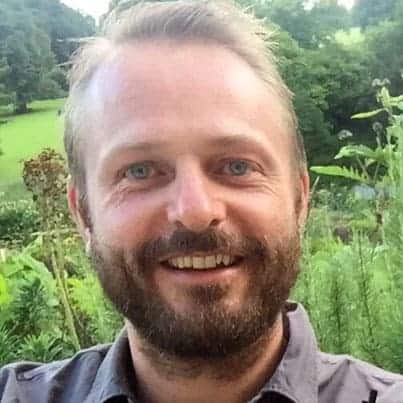
Mr David Baker
Advanced Practice Physiotherapist, MSK Sonographer and Independent Prescriber
David brings together his unique skills as APP, MSK Sonographer, experienced injection therapist, and lecturer to the courses. David works as an APP in private practice, working extensively with diagnostic ultrasound since 2007 and studied for his formal Pg Cert at Canterbury Christ Church University. He has further developed his special interest in ultrasound guided injection therapy.
What our attendees say about our other cadaveric injection courses
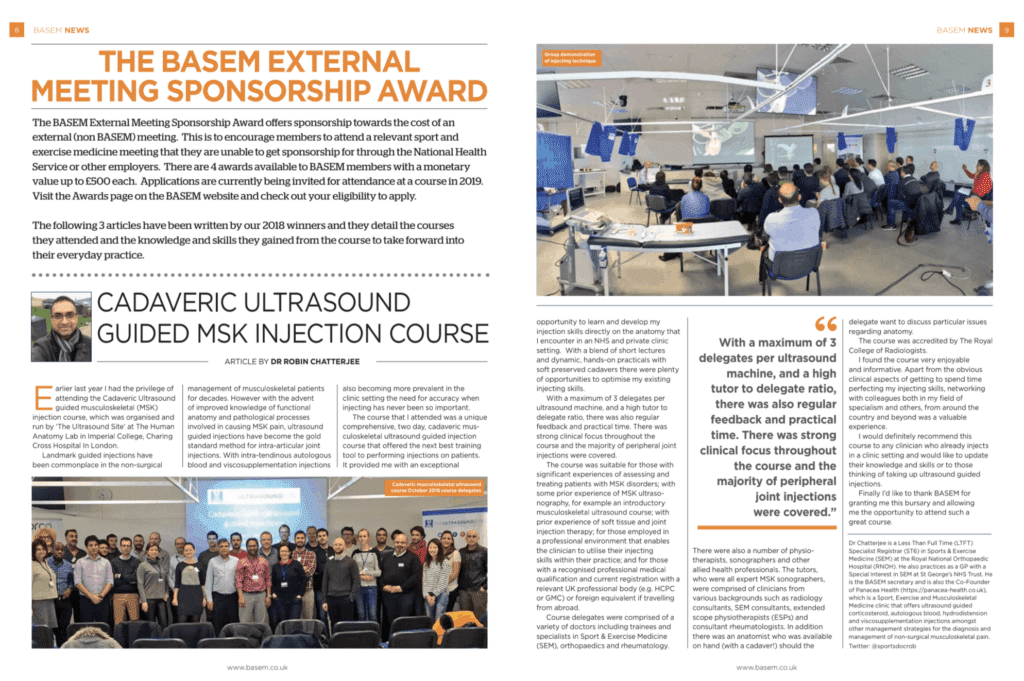
”I would highly recommend the ultrasound site cadaveric ultrasound guided injection course to any
clinician wanting to learn or develop ultrasound guided injection skills.
I did the lower limb day which was held at Queen Mary University London on the 16th of April 2021.
The pre course materials were excellent and allowed completion of the theory part before
attending the course. They are also a useful reference for after. This left plenty of time for the
practical element and in fact most the day was hands on practice which was what was really needed
The tutors are all knowledgeable and approachable and because there were only a limited number
of delegates per cadaver there was plenty of time for questions and for technique to be observed
repeated and refined.
The best part was the emphasis on getting good quality imaging and time was dedicated at the start
on how to get an optimal needle image which is in my opinion the most crucial skill to learn.
I look forward to attending for the upper limb course later in the year”
”I recently attended the 2-day cadaveric guided injection study days.
I have worked in physiotherapy for nearly 20 years with a strong MSK background. I have completed 2 years at Bournemouth University and achieved my PgDip in MSK Sonography and the intensity of my PgDip training was paralleled by the expert skills and knowledge of The Ultrasound Site training team.
The entire process from booking, confirmation and pre-course contact was exemplary. The admin team were always obtainable and swift to respond to any queries.
The pre-course learning resources provided a vast amount of information and insight into what would be covered and was provided in ample time prior to the course. The content and format of the learning materials was brilliant. We were given access to scanning protocols, narrated videos and slides on each scanned area so that even after we had completed the 2-days we could really consolidate our learning. This is of paramount importance for anyone undertaking image guided injections. These learning resources helped all the delegates confidence even before the course started. We had faith that we were under the tuition of some excellent mentors who were not only extremely friendly and down to earth but excellent educators.
The amount of practical time was very generous and covered all the necessary pathologies and techniques that we would use in clinic.
I have attended other USGI courses in the past but this one has been by far the most useful for me in the practical application of USGI’s into my MSK practice. I am truly thankful to all the team for making this course available to us during such a difficult time and I will definitely be continuing my training with them in the future”
”I recently attended the cadaveric musculoskeletal ultrasound guided injection course run by The Ultrasound Site and was highly impressed. The course is run by a variety of friendly and approachable health care professionals. Ranging from an musculoskeletal radiology consultant to extended scope physiotherapists who regularly scan and inject patients. This variety allows you to see the different types of approach/styles people use when injecting and gives you a chance to practice those different styles and see which one suits you best.
The course is very well organised and with a limited number of participants it means you can practice as much as you want and have the tutors on hand to guide you if you are having difficulties.
As well as a lot of hands on practice, there are a few tutorials to take you through the basics of ultrasound guided injections and also different treatments available when it comes to musculoskeletal injections and some of the evidence behind these treatments.
There was also an excellent anatomy demonstrator, Freddy, who is on hand to tell you anything you want to know and see regarding musculoskeletal anatomy. For real life practice it is of vital importance to know the proper anatomy of what you are injecting- it also makes it much easier to understand the pathology that can occur in each place and why.
The people who teach this course are clearly passionate and dedicated about their musculoskeletal work as can be seen by the amount of cases and discussions which occur on their website and social media. It makes a big difference when being taught by someone who enjoys what they do!
I would definitely recommend this course to anyone who wants to improve their hand eye co-ordination when it comes to ultrasound guided injections. ”
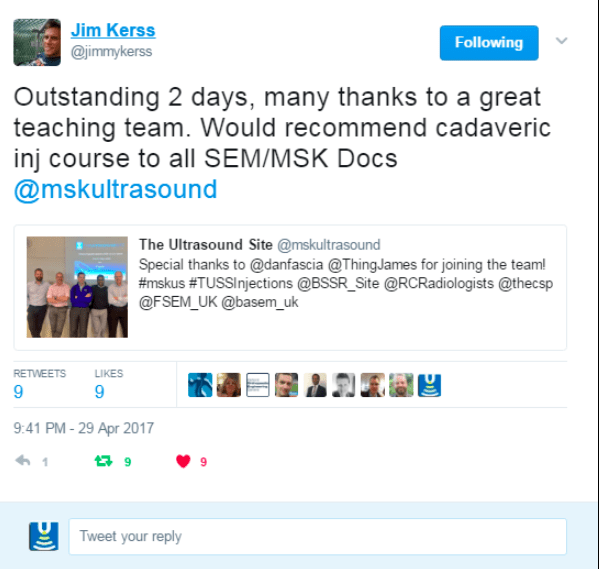
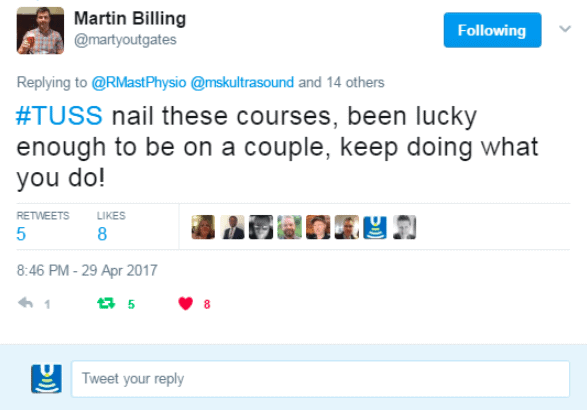
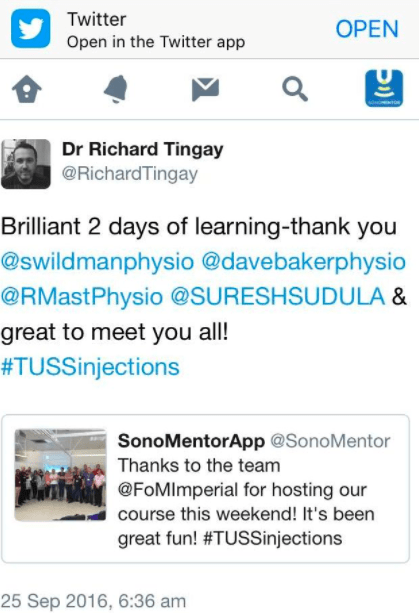

Course Dates & Booking
All prices shown below are inclusive of VAT
If your attendance on the course is to be funded by your trust or you have any other queries then please contact us.
| Date | Places | Price | |
|---|---|---|---|
| Date | Places | Price |

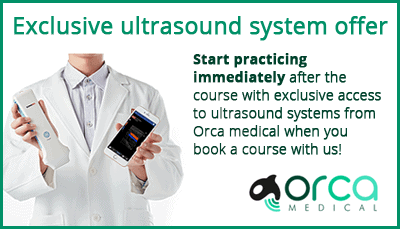
Cadaveric foot and ankle ultrasound guided injection course location
The Anatomy Centre, Anglia Ruskin University, Bishops Lane, Chelmsford, CM1 1SQ
FAQs
Q. How do I know that this course is of high quality?
All the lecturers on our courses have completed formal training MSK Sonography and have been using MSK Ultrasound for several years. Crucially, they are clinicians with many years experience of integrating ultrasound into their practice alongside other forms of imaging such as MRI giving a great breadth of experience to enable them to teach ultrasound in the correct clinical context.
Several teach on PG Cert MSK Ultrasound University based courses as guest lecturers, and present at different events each year. The lecturers are also members of executive committees of professional organisations such as the Chartered Society of Physiotherapy, The Royal College of Radiologists and British Association of Sports and Exercise Medicine, so are very familiar with MSK ultrasound and injection therapy development within different professional roles.
Q. Do we get to use the ultrasound machines?
We know the importance of hands-on practice when scanning! As we’ve been there when we were learning! So we can reply with a massive YES! The course is designed with high lecturer:student ratios, with on average a lecturer for every 5 students. We have a large number of machines to ensure that as much time as possible is spent with the students scanning under close supervision. We understand the subtlety of moving a probe to ensure you achieve a high quality diagnostic image. We try to provide a selection of machines including hand held mobile devices, laptop systems and cart based – this gives you the ideal opportunity to trial systems and work out what might suitable for you.
Q. Does this qualify me as a sonographer?
Surprisingly, a sonographer is not a protected title and therefore anyone can theoretically call themselves a ‘sonographer’. I guess a better way to pose this question would be ‘does this deem me competent to perform ultrasound in the setting I wish to use it in?’. Well, this depends on the setting and the local governance but essentially this course is designed as an important first step for people who are considering an ultrasound qualification, or who are interested in learning ultrasound to give them an idea of how ultrasound may fit into their practice. The course can also serve as a refresher, perhaps for certain joints.
To undertake a formal qualification which would lead you to be able to work in for example Radiology departments within the NHS you would need to progress on to complete a PG Cert qualification on a CASE accredited course. This course would place you in a strong position before starting your CASE course. We are creating a University accredited CASE course at the moment and hope to release news in early 2018!
Q. How do I know if I am scanning things correctly?
Because we have a large ratio of lecturers to students, there will be someone overseeing and teaching with each group for as much time as possible throughout the day to ensure that you are handling the probe correctly and there are lots of tips on image optimisatio and use of the machine technology to get the best image! Basically, we will be peering over your shoulder! After the course you can also join us on our Medshr group, to keep touch and share images for feedback and as a record of your ongoing learning.
Q. What are the advantages of doing this course?
The advantages of doing this course is that all of the tutors have extensive experience of working with ultrasound and ultrasound guided injections working within busy Radiology, NHS , Private and Sports injuries clinics..we have it all covered! Most importantly, we are enthusiastic and passionate about teaching..that is why we set this up in our spare time!
Q. What are the terms and conditions for refunds and bookings?
All details for the refund policy and bookings terms and conditions can be found HERE
Q. Do I need to have scanned before in order to attend a course?
For our Introductory MSK Ultrasound course..No. We have many people who attend the course who have little, or no, previous scanning experience. This course is designed to accommodate people who have no previous scanning experience and are interested in learning from scratch. However, as mentioned above, it is also a very useful learning experience for people with some scanning background as well.
For our injection courses it is best to have attended the Introductory course first. Have a read of this blog as well to gain some more ideas on why developing your diagnostic skills first is a good idea.
Q. Do you provide training to whole departments?
We are able to travel and provide a customised training program for a group of clinicians in a department. For further discussion email us at [email protected]
Q. Does this course qualify me to perform ultrasound guided injections in my workplace?
No. In order to perform image guided injections in your workplace you must conform to local guidelines and competency requirements. This course, however, may form part of your CPD and learning if you are looking to start performing ultrasound guided injections, or as a top-up course as part of your continuing CPD.